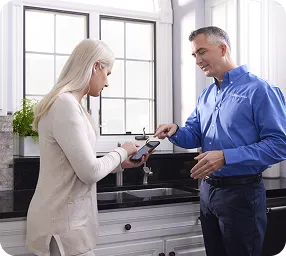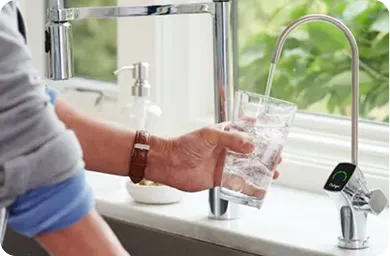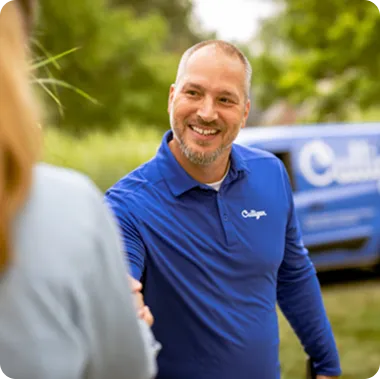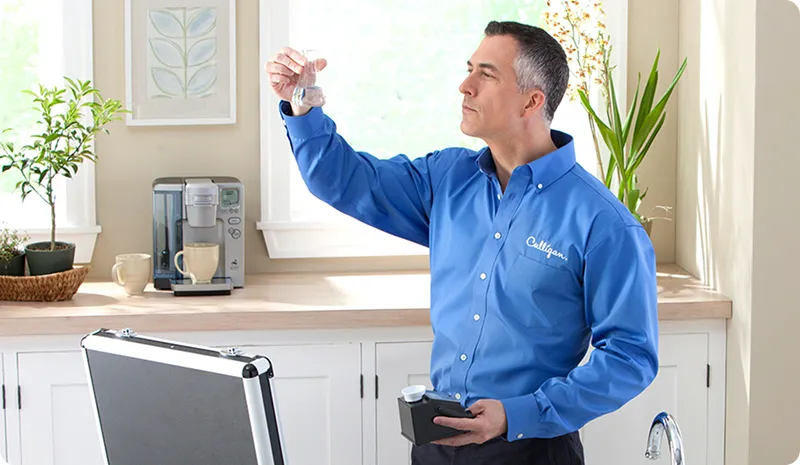Blog
Do you Need a Water Softener?
Published: January 31, 2026

Many homeowners have asked themselves this question. Is a water softener necessary? What’s the difference between hard water and soft water? Does it matter?
Hard water vs. soft water
We’ve all heard of issues hard water can cause: damage to your hair, skin, plumbing…but what is hard water and what damage can it do?
A lot more goes into your water than just H2O. Water quality is impacted by a number of factors including where you live, and if your water supply comes from a private well or a municipality. Hard water can be an issue in either source.
Minerals within water are what makes certain water “hard” vs. “soft.” Calcium and Magnesium are the most common minerals found in water. These minerals are often found in water because groundwater will dissolve certain rocks or metals, and the remnants stick with the water on its journey to your home.
These dissolved solids can cause a scaly buildup on everything from dishes to your skin. Corroded plumbing is oftentimes the result of hard water.
Culligan Water has great suggestions for treating hard water issues in these states: Arizona, Idaho, Illinois, Iowa, Minnesota, Missouri, Montana, New York, Pennsylvania, and Wisconsin.
Water softeners are able to remove those hard minerals, making it easier to clean home, laundry, and body—while prolonging the life of your plumbing and appliances.
How do water softeners work?
Typically, a water softening system works by removing things like calcium, magnesium, iron, and manganese from hard water and replacing them with sodium ions.
Ions are atoms or molecules that carry either a negative or positive charge due to an imbalance between electrons and protons. Anions have a negative charge and cations have a positive charge.
Calcium, magnesium, iron, and sodium are all cations. However, sodium has a much weaker charge—making the exchange possible.
Our water softeners use either ion-exchange resin beads or zeolite, a special mineral that comes in the form of tiny crystals. Each of these medias is negatively charged and has space for holding onto positive ions. As hard water passes through your water softening system, the stronger charged magnesium or calcium are pulled towards the media like a magnet. Because the hardness minerals have a higher positive charge than the sodium, they are able to knock the sodium ions off and take their place.
The hardness minerals remain trapped in the water softener tank, while the now softened H2O is dispersed throughout your home for use. You’re likely wondering what happens to the minerals trapped within your tank, this is where the process of regeneration comes into play!
Water softener regeneration
Regeneration is the process a water softening system uses to clean and recharge itself so that it may continue providing you with soft water.
All water softeners come with a secondary storage tank. This is where you’ll need to add water softener salt. Water is then added to the tank, creating brine and giving this tank the name “brine tank.”
Live in a brine-restricted area or just want to explore the breadth of water softening and water conditioning solutions? Check out our salt-free alternative water softeners.
During the regeneration process, the water softener will pull the brine solution into the main tank and the ion exchange process happens again in reverse.
The media essentially takes a bath in the salt solution. Hard minerals caught in the zeolite or resin are released and the media is replenished with sodium ions. During the regeneration process, the water softener is also cleaned and disinfected.
Do you need a water softener?
Some believe water softeners are a luxury or are only necessary if you have a private well. If you have a well, it’s likely you’ll need a water softening system and possibly other types of water filtration for improving water quality.
However, living in the city does not make you exempt from hard water issues. While municipalities are required to treat water for impurities, they do not remove hardness minerals because it’s not harmful to your health.
The modern home requires soft water. High efficiency appliances are unable to run as they’re designed to when they suffer from hard water build up.
Signs that your home is suffering from hard water include but are not limited to: your skin feeling itchy and dry, your fixtures and sinks are holding residue, your household appliances aren’t running efficiently, and your hair is feeling dull or dingy.
Benefits of a water softening system from Culligan
- Real-time feedback. Push notifications and text messages alerting you to any unexpected water flow. Low salt reminders let you know when you are low on salt before hard water reminds you.
- Total Control. Conserve water and save money by knowing your daily, monthly and yearly water usage.
- Remote Diagnostics. Remote dealer diagnostics so your local Culligan expert will receive notifications about your softener the same time you do.
Set up a free in-home water quality test with your local Culligan expert today to discover the best water softening solution for you.





